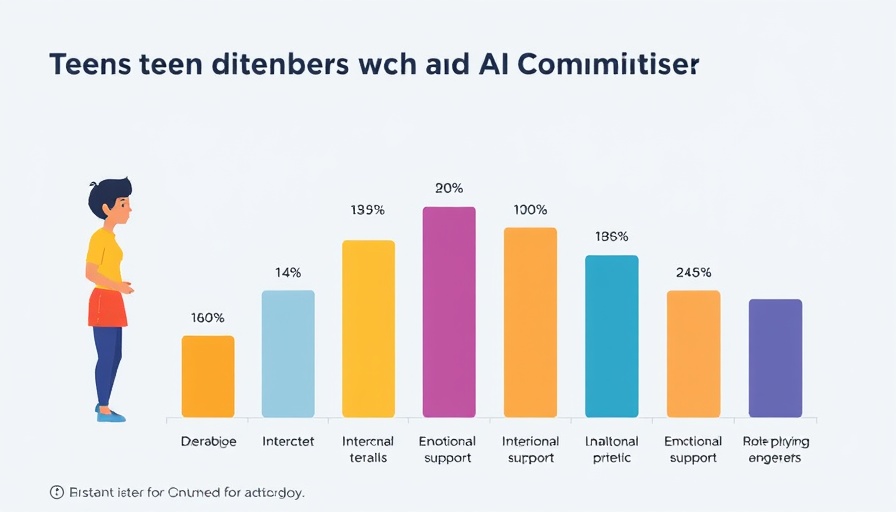
The Rise of AI Companions Among Teens: A New Study’s Findings
A recent report from Common Sense Media has surfaced some striking statistics that unveil a significant trend: 72% of U.S. teens have interacted with AI companions, and over half of that group now engage with these bots regularly. As a parent of school-aged children, it's crucial to understand this shift in social interaction, as it may shape your child's developmental and social experiences.
Understanding AI Interaction: More Than Just a Trend?
While the study is based on a survey of 1,060 teens and serves as an indicative measure rather than a definitive overview, the data points to a larger cultural phenomenon. AI bots have rapidly become part of the social fabric for many young people. It’s worth noting that while the technology is evolving, AI companions are far from perfect human simulators. They respond based on programmed algorithms and learned contexts but lack the genuine emotional connection present in human interactions. This discrepancy raises questions about the future of teen relationships and the potential consequences on their social skills.
The Psychological Implications of AI Companionship
As AI companions become commonplace, one must consider the psychological impact this reliance on technology could impose. On the one hand, about 18% of teens reportedly use these bots for advice on topics they feel uncomfortable addressing with friends or family. This could enhance their communicative skills and provide a safe outlet for exploring personal issues. However, the question remains: could it also lead to the diminishing value of human connections?
Potential Benefits: AI as a Social Tool
There are undeniable benefits to integrating AI companions into teens' lives. For one, they can provide support for social anxieties that many adolescents face. Having a virtual friend can give young individuals the confidence to express themselves in areas where they might typically hold back when interacting with peers. Yet, it’s vital to maintain a balance, ensuring that technology serves as a tool rather than a substitute for essential human relationships.
Pitfalls to Be Aware Of: Risks of Overreliance
Parents should be aware of the risks associated with too much dependence on AI companions. With 33% of teens already leaning on AI for aspects of social interaction and relationships, there is a chance that this could hinder their ability to form meaningful connections with their peers. Furthermore, technological failures—such as hacking or potential malfunctions—could expose vulnerabilities in how teens perceive relationships.”
Future Considerations: What Lies Ahead?
As technology continues to advance, AI companions will only grow in complexity and responsiveness. If trends hold, we might witness the emergence of AI tools that simulate romantic relationships. This development could redefine social norms and raise ethical questions. It is an opportunity for parents to engage in conversations with their children about these tools while promoting mental health awareness and social skills development.
Encouraging Healthy Conversations at Home
To help your teen navigate the complexities of social interaction in a tech-driven world, it’s vital to foster open dialogues about technology’s role in their lives. Initiate conversations about both the positive aspects and the potential downsides of AI companions. By understanding these dynamics, parents can better equip their children to maintain a balanced and healthy approach towards technology and peer relationships.
Actionable Insights for Parents
Consider establishing boundaries regarding screen time and digital interactions. Encourage your teen to engage in extracurricular activities that promote face-to-face interaction, enabling them to develop critical social skills. Furthermore, those utilizing AI companions might benefit from a blend of therapeutic approaches, guiding them in distinguishing between AI interactions and nurturing authentic human relationships.
Ultimately, navigating the rise of AI companions involves a blend of understanding and guidance. As parents, it's our responsibility to remain engaged and informed about the technologies that influence our children’s lives.
 Add Row
Add Row  Add
Add 




Write A Comment